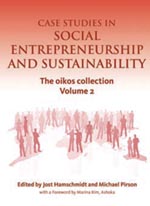Case Studies in Social Entrepreneurship and Sustainability
 |

Case Studies in Social Entrepreneurship and Sustainability. The oikos case collection Volume 2.
Edited by: Jost Hamschmidt and Michael Pirson
Published by : Sheffield UK: Greenleaf Publishing
Published in: 2011;
452 pages

Book Reviewed By: Dr. Susan Mueller,
University of St. Gallen
|
Social entrepreneurship education has grown rapidly over recent years. Students around the world are embracing the subject and educational institutions have recognized the importance and relevance of the topic. The increase in social entrepreneurship courses and programs brings with it the need of good teaching materials for educators. The second oikos case collection provides a valuable resource for that purpose. It features fifteen peer reviewed, selected cases from the oikos Global Case Writing Competition, a program that promotes the writing and distribution of high-quality teaching case studies in the sustainability and social entrepreneurship arena. |
|
The case studies are presented in Part II to Part V of the book.
Part II is called "Understanding the Nature of the Social Entrepreneur".
This section includes an essay by Greg Dees on the meaning of social entrepreneurship and four case studies that can serve as introductory cases in social entrepreneurship classes. The four cases cover an interesting spectrum of the types of problems that social entrepreneurs are tackling, ranging from the collection and transportation of water in rural areas (Case 1: So You Want to Be a Social Entrepreneur?), to village development (Case 2: Gram Vikas), poverty reduction (Case 3: KickStart), and healthy food provision in New Zealand (Case 4: Kapai New Zealand)
Part III, "Entrepreneurial Action for Developing Inclusive Markets":
Contains four case studies featuring social entrepreneurs aiming to create sustainable markets for electricity (Case 5: Fabio Rosa), develop and distribute medication to prevent and treat cardiovascular diseases (Case 6: Dr. Reddy's), set up an organization to provide agricultural microfinance (Case 7: ALTIS), and to market affordable reading glasses to the poor (Case 8: VisionSpring).
Part IV, "Topic Spotlight: SE Approaches for Tackling Water Challenges",:
Is comprised of three case studies on social entrepreneurs tackling the challenge of unsafe drinking water. Procter & Gamble (Case 9) produces and distributes chemicals provided in a powdered form to purify water. Trevor Field (Case 10) developed a system that uses merry-go-rounds or "PlayPumps" to pump water. While the children go round, water is pumped from underground. The third case features WaterHealth International, a company that purifies water using UV light.
Part V is called "Scaling, Legitimacy and Profit Challenges for Mission-Driven Organizations":
While the social entrepreneurs featured in the preceding case studies operate in developing countries (with the exception of Kapai in New Zealand) this section only contains cases of companies operating in industrialized countries.
Better Place is aiming to create a mass market for electric cars (Case 12).
Noir/Illuminati II (Case 13) offers socially responsible and affordable luxury clothing.
The ReUse People (Case 14) demolish houses and reuse the material. And finally,
LivingHomes (Case 15) builds "low-energy, non-toxic, healthy homes".
Part VI summarizes resources for case writers and teachers, such as guidelines for case writing, inventories of case writing competitions, and case collections.